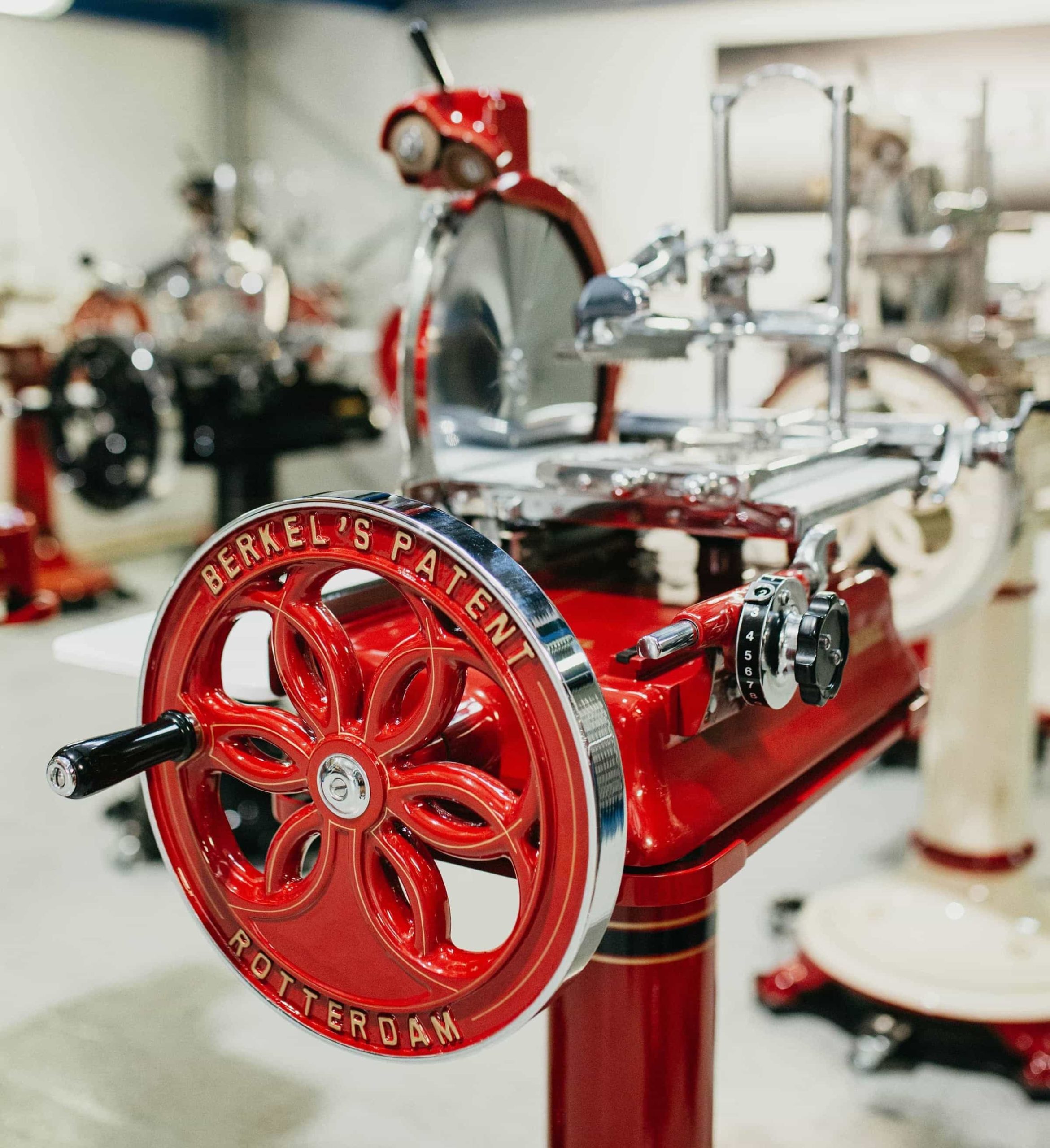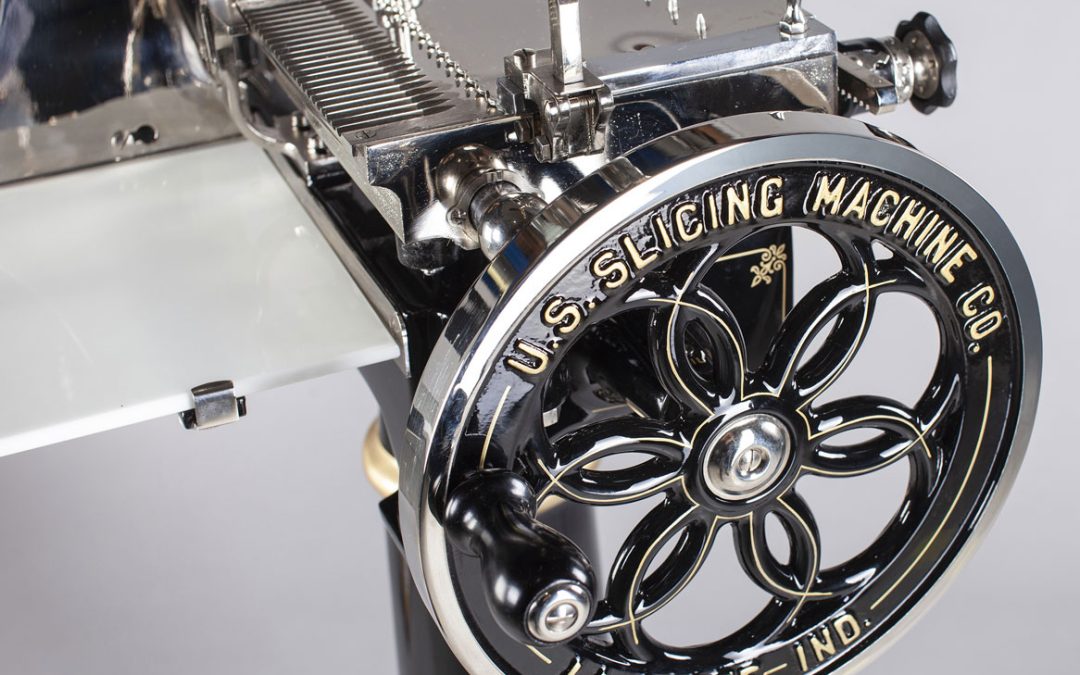In the culinary world, few objects have the capacity to enchant like the restored original Berkel flywheel slicers.
These machines, born at the dawn of the 20th century, have become a symbol of elegance and precision, icons of design. Each vintage Berkel slicer tells a unique story, a journey through time that combines tradition and innovation. In this article, we will explore the importance and fascination of Berkel flywheel slicers from three different perspectives: that of the architect, the designer and the chef, revealing the qualities that make them invaluable pieces in every field.
Design and architecture in the kitchen
Architects see the restored Berkel flywheel slicers as an extraordinary example of functional art. Frank Lloyd Wright, famous for his organic approach to architecture, once stated: ‘Form and function should be one, united in a spiritual union’. These words resonate perfectly in the context of Berkel’s original slicing machines. Their structure, with artistic details and elegant finishes, represents a combination of aesthetics and utility. Each slicer is a piece of history that testifies to an era when craftsmanship and attention to detail were paramount.
Architects such as Renzo Piano have often emphasised how everyday objects can transcend their function to become expressions of beauty. Berkel flywheel slicers embody this philosophy.
Deciding to include an antique Berkel slicer in a renovation project, for example of a historic villa, highlights its ability to act as an aesthetic centrepiece, uniting history and modernity. Its elegant curves and details add a touch of class and nostalgia, recalling the golden age of craftsmanship.
Design objects for kitchens
For designers, Berkel slicers are a triumph of industrial design. Philippe Starck, a modern design icon, emphasised the importance of combining aesthetics and functionality, saying: ‘Design is a vision of life. It can change the world into something better’. The flywheel of these slicers is not only functional but becomes a symbol of beauty, a centre of attraction that tells stories of innovation and timeless design. These machines are appreciated for their ability to combine form and function in a harmonious way, thus becoming more than just kitchen tools: they are works of art.
Interior designers can integrate a restored Berkel slicer into a modern kitchen environment of a luxury restaurant, combining functionality and style without compromise.
The authentic Berkel slicer, with its polished finish and flywheel, becomes a work of art, celebrating tradition in a contemporary context.
This experience confirmed the words of Charles Eames: ‘Detail is not detail. It is the essence of design’. Authentic Berkels embody this maxim, offering both impeccable functionality and timeless aesthetics.
Precision for the Chef
From the chef’s point of view, an original Berkel flywheel slicer is not only a beautiful object, but an indispensable ally in the kitchen. As Auguste Escoffier, father of modern cuisine, once said: ‘Good cooking is the basis of true happiness’. The precision in cutting slices, the sharp blade, and the adjustment of the thickness are essential for the preparation of excellent dishes. Chefs from all over the world praise these machines for their durability and reliability, essential for professional cooking.
Chefs from Michelin-starred kitchens choose Berkel’s restored flywheel slicers for their precision and quality in cutting, which are essential to maintain high standards. This tool is not just an aid in the kitchen, it is a partner that elevates the art of cooking.
Berkel Model B: A Jewel in the Collection
Berkel’s Model B represents a special chapter in the history of slicing machines. Launched in 1919, it redefined the standards for these machines. With its clean lines and compact design, it became a favourite in grocery shops as well as in the kitchens of renowned restaurants. As chef Gordon Ramsay said: ‘Cooking is an art and equipment are my brushes’. Model B, with its eye-catching aesthetics and exceptional functionality, is a masterpiece that combines tradition, innovation and culinary artistry.
Restored original Berkel flywheel slicers
In conclusion, the restored original Berkel flywheel slicers are more than just kitchen tools. They are living testimonies of history, innovation and craftsmanship, enchanting architects, designers and chefs with their unique charm. These machines not only perform their function with precision but also carry with them a legacy of beauty and tradition, making them indispensable in any environment where style, functionality
The restored original Berkel flywheel slicers are an outstanding example of how everyday objects can ascend to true cultural symbols. Whether you are an architect, designer or chef, these machines offer a unique blend of aesthetics, history and functionality, making them invaluable in any setting where style and performance are paramount.


